Mr. President,
Today’s resolution – on the ‘Situation in Myanmar’ is of utmost significance to Bangladesh. We share borders with Myanmar; we host over a million of their people. Therefore, stability in Myanmar is critically important for us in finding a durable solution for the million Rohingya we host, who are victims of atrocity crimes. However, the resolution that was adopted falls far short of our expectations. It fails to recognize in its operative part, the urgent need for creating conditions for the safe, voluntary and sustainable return of the displaced minorities of Myanmar, particularly the Rohingyas.
We acknowledge the efforts of the member states who had been involved in the negotiations. We thank those who reached out to us, and consulted us. However, we do not see our fundamental priorities adequately reflected in the resolution, especially in the operative part. Therefore, despite being one of the most affected countries, we decided to abstain from this resolution.
Mr. President,
As a democratic country, Bangladesh deeply cares about restoration of constitutional order in Myanmar. However, any resolution on Myanmar, whatever may be the context, would remain incomplete if it doesn’t recognize the root causes of the Rohingya crisis and make concrete recommendations to address them. Failure of the international community to address those root causes, even after the ethnic cleansing in 2017, has led to a culture of impunity in Myanmar, and we can see that playing out now for other minorities as well.
Mr. President,
Bangladesh is not a party to the 1951 Refugee Convention. Yet we opened our border for the persecuted Rohingya on multiple occasions over the last four decades. We greatly appreciate the support of the international community, including the humanitarian assistances provided for the displaced Rohingyas. However, humanitarian assistance alone is not the solution to the Rohingya crisis. Neither does it help with the challenges that are faced by Bangladesh as a host country. What is needed is a political solution. The crisis was created in Myanmar; and its solution must be found in Myanmar.
We remained bilaterally engaged with Myanmar in good faith towards that end. We have engaged with regional countries and organizations for their support in the same spirit. We reposed our trust in the UN. My Prime Minister stood in this august Assembly and appealed to the international community to take custodianship of our bilateral efforts. Unfortunately, no progress has been achieved so far in creating the conditions that are essential for their safe return.
Mr. President,
The resolution calls for the swift implementation of the five-point consensus reached at the Leaders’ Meeting of the ASEAN, which however, does not address the repatriation issue. Moreover, the recent comments of the Myanmar military leader, [who was part of the ASEAN Leaders’ Meeting] in public media, rules out the possibilities of any policy reforms that are fundamental for the safe and sustainable return of the Rohingyas. In this situation it was all the more important for this resolution to stress the need for creating conducive environment for the return of the Rohingyas.
Mr. President,
The OIC and the EU jointly tables an annual resolution in the 3rd Committee on the human rights situation of Rohingya Muslims and other minorities in Myanmar. The resolution recognizes the importance of addressing the root causes of the Rohingya crisis and also calls for actions that would lead to a comprehensive solution to Myanmar’s democratic and other socio-political challenges. So do the Human Rights Council resolutions, including the latest one adopted in March after the military coup in Myanmar.
We have also been encouraged to see precise Press Elements of the Security Council and the PRST, which recognizes the impacts of the coup on the repatriation of Rohingya Muslims and other displaced minorities. It is therefore, disappointing to see that the General Assembly is deviating from this trend in this very important resolution acted upon today. This would send a wrong message.
Mr. President,
While we abstained in this resolution today our efforts to resolve the Rohingya crisis with support from this august assembly would continue. For the last four years, we have received overwhelming support from the international community on the Rohingya issue. It is such efforts that have resulted in the creation of multiple mechanisms in the UN, such as the office of Special Envoy, the Special Rapporteur, and the Independent Investigative Mechanism on Myanmar and so on. Multiple accountability processes have taken concrete shape, thanks to our combined efforts. And it is important that such strong resolve to act doesn’t falter until such time that we find a durable solution to the Rohingya crisis.
Bangladesh will continue to engage with the brotherly countries of OIC and other partners, including ASEAN and the EU, to continue to reach an early resolution of this crisis.
I thank you, Mr. President.

